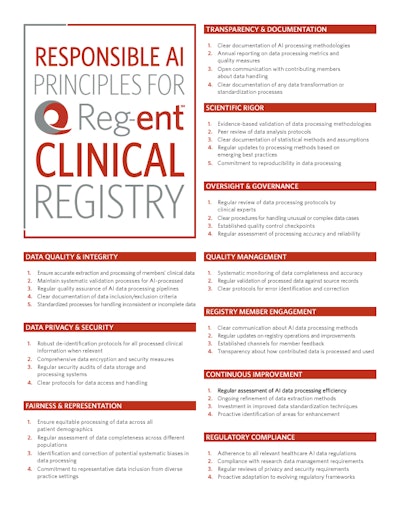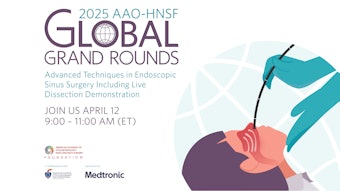The Future of the Reg-ent Registry Is Here
Reg-ent is leveraging artificial intelligence (AI) for enhanced data quality and research opportunities.

By integrating data from participating organizations’ electronic health records (EHRs), the Reg-ent Registry has assembled a comprehensive dataset encompassing over 11 million patients. This collection of real-world data and clinical information enables researchers and clinicians to better understand disease pathophysiology, treatment efficacy, and long-term outcomes to inform evidence-based and quality improvement research.
EHRs have long been central to data collection, delivering insights into patient histories, treatment adherence, and care quality. EHR-derived real-world data helps guide day-to-day clinical practice and long-term studies, from tracking disease trajectories to validating quality metrics.
Historically, the Reg-ent Registry has collaborated closely with leading community and academic practices to gather patient-level data suitable for quality reporting and research. Through our recent partnership with MatrixPPA, we have gained greater flexibility in data abstraction methods, enabling us to build a multi-modal data repository. This capability sets the stage for addressing the persistent challenges in EHR data utilization outlined below.

Persistent Challenges in EHR Data Use
Despite their transformative role, EHRs present inherent challenges that can impede the Reg-ent Registry’s full potential. Notably, these include:
- Complexity of Data Extraction and Processing
Extracting and refining EHR data for research often requires specialized technical expertise. Complex database architectures, proprietary formats, and advanced natural language processing requirements can slow efficient data retrieval, standardization, and analysis. - Data Quality and Completeness
EHR data may contain missing values, incomplete patient histories, inconsistent coding practices, and variable levels of documentation detail. These irregularities can limit quality measures' reliability and constrain the research findings' depth and robustness. - Inconsistent Documentation Practices
Clinicians record care in diverse ways, from structured fields to narrative free-text notes. This variation complicates standardization efforts and can bias research if certain information is not consistently captured.
Although the Reg-ent Registry has already demonstrated its value, these EHR issues have delayed realizing its potential as the gold-standard otolaryngology-head and neck surgery repository for evidence-based care and quality improvement research.
MatrixPPA: Powering the Next Generation of the Reg-ent Registry

Enhanced Data Quality and Completeness
MatrixPPA’s capabilities enable the Reg-ent Registry to connect seamlessly with EHR systems—both large and small—and automate data extraction at intervals aligned with participant needs. This approach allows the integration of relevant data, from social determinants of health and family history to oncologic information, allergies, immunizations, and more rich and comprehensive clinical observations. By broadening the data spectrum, researchers can now access more complete patient profiles, enabling more nuanced analyses and deepening the insights gleaned from real-world otolaryngology-specific clinical data.
Simplifying Complexity Through AI

Converting unstructured clinical data—such as physician notes and patient-reported outcomes (PROs)—into standardized, codified formats (e.g., SNOMED codes) has long been a challenge owing to inconsistencies in documentation and the complexity of medical language. MatrixPPA’s advanced natural language processing models now automate this process, transforming free-text narratives into structured, standardized data elements with precision.
For example, using AI, we have developed custom models to extract data from audiograms into the underlying discrete data fields for the end user, allowing Reg-ent member practices and institutions to analyze critical clinical details across records without manually transcribing the information.
A key advantage of this approach is its ability to assign confidence levels to extracted terms, providing a quantifiable measure of AI algorithm performance. Each result is accompanied by a confidence score that provides a window into the trustworthiness of the information before it is integrated into clinical workflows or derivative analytics. This ensures that decision-making processes—whether for research, treatment planning, or quality reporting—are based on data that meets predefined accuracy standards.
By leveraging AI to enhance data processing and transparency, we can more effectively incorporate patient outcomes, symptom progression, treatment effectiveness, and quality-of-life indicators into research and real-world clinical applications. This improves the precision of data-driven insights and empowers physicians to make more informed, evidence-based decisions while maintaining confidence in the abstracted data.
Balancing Innovation with Responsibility
Although AI significantly accelerates and refines data processing, it has limitations. These models, trained on complex datasets, may occasionally misclassify, produce inaccurate outputs, or fail to capture certain data elements outright. Recognizing these challenges is crucial to maintaining the integrity and trustworthiness of the Reg-ent Registry. To navigate these challenges responsibly, we must balance the transformative potential of AI with diligent oversight, rigorous validation, and continuous improvement.
A Commitment to Responsible AI
A comprehensive set of principles guides our approach to implementing AI to ensure accuracy, security, fairness, and transparency. We prioritize data quality and integrity by employing systematic validation protocols, routine human-in-the-loop quality assurance checks, and transparent data inclusion and exclusion criteria documentation. Equally important is our commitment to data privacy and security, which encompasses strict de-identification procedures, comprehensive encryption methods, and stringent controls over data access.
We strive to achieve fairness and representation across all patient demographics and sensitive features, regularly assessing the completeness of our datasets and actively identifying underrepresented entities. Transparency informs every step of this process, from openly sharing AI methodologies to providing annual reports on data processing metrics and improvements. We ground our efforts in scientific rigor by validating data processing techniques using evidence-based methods, subjecting analytical protocols to peer review, and continuously updating our approaches to align with emerging best practices.
Oversight and governance further enhance the reliability of our AI-driven processes by ensuring clinical experts regularly review data protocols and that established procedures guide decision-making in handling complex or unusual cases. Rigorous quality management, including systematic accuracy monitoring and prompt error correction, reinforces trust in our registry as a source of credible and actionable information.
By engaging with registry members through open communication channels, timely updates, and opportunities for feedback, we maintain a collaborative environment that fosters continual improvement. This commitment to ongoing enhancement encourages us to refine our AI data extraction and standardization techniques over time, proactively identifying areas for improvement and adopting new methods as they arise. Finally, we remain fully compliant with all relevant healthcare regulations and research data management requirements, adapting to evolving frameworks to ensure our work remains lawful, ethical, and safe.
A New Era for the Reg-ent Registry
With MatrixPPA’s involvement and our dedication to these responsible AI principles, the Reg-ent Registry stands on the cusp of a transformative phase that addresses historical challenges and unlocks the full potential of its expansive dataset. By embracing innovation, strengthening data quality, refining AI-driven processing models, and maintaining transparent, ethical governance, we will enhance our ability to produce high-quality, actionable research. In doing so, we will drive better clinical outcomes in otolaryngology and beyond, ultimately improving patient care for years to come.
The future of the Reg-ent Registry is bright. Through strategic partnerships, cutting-edge technology, and a steadfast commitment to responsible AI, we are poised to deepen the quality and depth of our data, empower more meaningful research endeavors, and enrich the standard of care in otolaryngology.




















